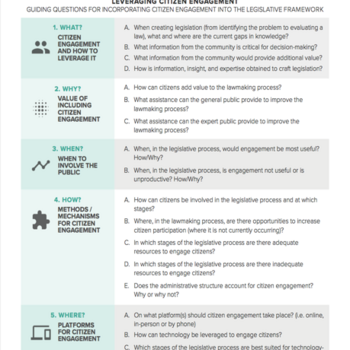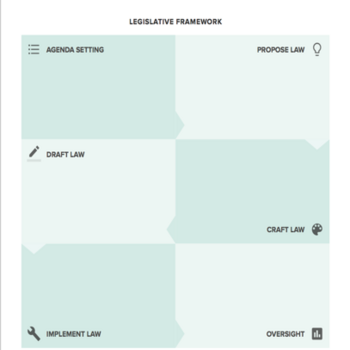Clinic Explores Citizen Participation in Lawmaking at Parliamentary Conference

Members of Yale Law School’s Governance Innovation Clinic recently participated in ParlAmericas’s Second Annual Gathering of the Open Parliament Network. The event, which took place from March 15-18, 2017 in San Jose, Costa Rica, focused on strengthening ties between citizens and their legislatures. It featured more than 70 members of parliament as well as civil society representatives from across the Western hemisphere.

The conference began on a sobering note, as a panelist cited a recent Barometro Latinoamericano poll, stating: “A majority of citizens do not feel adequately represented by their government.”* This statement came backed by statistics from the Organisation for Economic Co-operation and Development (
OECD) showing that worldwide, only 40% of citizens trust their governments. In the U.S. alone, only 19% of citizens say they can trust the federal government to do what is right (Pew, 2015). This trend underpinned two days of workshops addressing transparency and legitimacy issues.
Yale’s clinic team, directed by Florence Rogatz Visiting Clinical Professor of Law Beth Simone Noveck '97, was invited to facilitate a workshop on “smart parliaments,” leading participants in an interactive discussion on techniques for enabling inclusive and innovative legislative processes. Building on their semester-long work investigating effective citizen engagement models, the team sought to explore engagement and technology solutions as they relate to the citizen trust crisis from the perspective of parliamentarians.
The citizen engagement team represents one of multiple teams working on an array of topics within the Governance Innovation Clinic — all addressing the core issues of strengthening democratic institutions through legal and technological innovations that transform and improve governance. Other topics the clinic is working on include developing innovative anti-corruption mechanisms, providing data-driven legal services, and using digital technology to improve prisoner education.
“Clinic teams work to identify their client’s core problem and then to design an actionable solution,” said Gabriella Capone (JD/MBA ’19), who presented at the conference with teammate Aprille Knox (Jackson ’17). “For us, it entails helping our client to design a citizen engagement system to address citizen distrust and apathy. We’ve been fortunate to engage with leading thinkers, including Professor Noveck, in an emerging civic space that uses crowdsourced citizen insights in lawmaking processes — known as Crowdlaw.”
While getting citizen buy-in is a key concern when designing new citizen engagement models, understanding the perspective of legislative stakeholders is equally essential, though is often neglected, the team said. Thus, the ParlAmericas conference provided a first-of-its-kind opportunity to collect insight from parliamentarians themselves on the benefits, pitfalls, and opportunities for increased citizen engagement.
In collaboration with Cristiano Ferri, a thought-leader in digital citizen engagement strategies and author of The Open Parliament in the Age of the Internet, Capone and Knox presented unique tech-driven models and led participants in small group discussions regarding the value of citizen participation in the law-making process. To this end, they sought to better understand how parliamentarians conceive of their governments’ legislative processes. Inspired by human-centered design methods, the session focused on the following strategic questions:
1. Where, in the legislative process, did legislators think there was opportunity for citizen involvement?
2. Where, in the legislative process, did legislators think it would be most challenging to involve citizens?
3. On what would legislators most like to hear from the general and/or “expert” public?

Findings indicated that attendees were particularly interested in exploring opportunities to leverage social media and information communication technologies (ICT) for engaging citizens. However, lessons on how best to incorporate technology into citizen engagement processes are not widespread, and there are concerns that online mechanisms may alienate segments of the population (particularly in resource-poor areas), the study found. Participants were also enthusiastic about involving citizens earlier in the legislative process rather than later. A key concern, however, revolved around civic education, specifically how to sufficiently educate or prime citizens on a particular topic before introducing them into the legislative process. This concern points to an engagement paradox, students said. On the one hand, citizen distrust is often fueled by limited access to information and past corruption, which coupled with citizen apathy, deters participation. On the other hand, legislators’ perceptions of uninformed citizens further disincentivizes the creation of new engagement opportunities.
These insights directly inform the team’s clinic work for Podemos, a Spanish political party that has requested design and evaluation recommendations for enhancing citizen participation mechanisms in Madrid’s legislative process. By clarifying parliamentarian perspectives on citizen engagement, the team, which also includes David Murdter (JD/MBA ’19) and Birce Gokalp (Jackson ’17), is better equipped to understand this stakeholder and to assist in developing citizen engagement systems that bring an oft-neglected user to the foreground.
For more information on the Clinic’s work, visit the website or follow the team on Twitter: @CrowdlawYale.
*[1] 2014 Barómetro Latinoamericano. Only 15.8% of respondents reported high confidence in parliament.
Photo Caption 1: The team provided a standardized, step-by-step legislative process, onto which participants could map their legislative process, facilitating comparison across jurisdictions.
Photo Caption 2: The discussion was framed by questions that encouraged participants to reflect on nature of their governments’ legislative processes, and the “who, what, when” of how citizens could be brought into the process.


